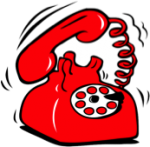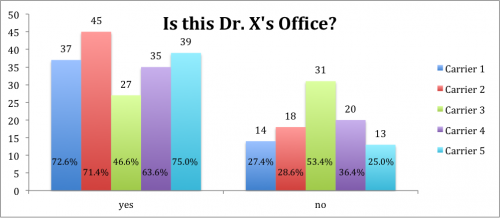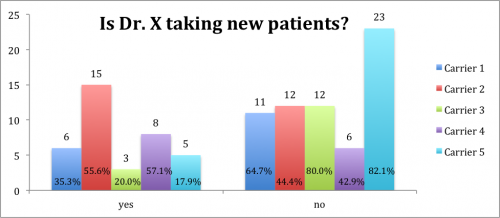by Emily Michels, Health Policy Fellow
I’m used to calling wrong numbers. Sometimes I remember them wrong or scribble the numbers illegibly and end up reaching someone I didn’t intend to call. But when I’m doing something as important as scheduling a doctor’s appointment, I want to be able to trust the number I’m dialing. As a consumer, I have a reasonable expectation that the provider directories posted online by insurance companies are supposed to contain up-to-date and accurate information about the providers available in my network; however, these lists frequently fall short.
Under regulations issued last February by Health and Human Services (HHS), insurance companies are required to keep “up-to-date, accurate” information online for any member of the public to access. These directories, filled with hundreds of provider names, organized by specialty, location, and other qualifiers, give the sense that there are tons of options for those seeking care. In the interest of examining whether an insurance network has a sufficient pool of accessible providers to provide care to its enrollees (known as “network adequacy” in health insurance jargon), CCHI conducted a small-scale “snapshot” study to test how accurate these directories really are in Colorado. The bottom line is that these directories are falling short of what is required of them, to be an accurate and accessible tool for the consumer.
The Study
Using the directories on five insurance carriers’ websites, we called the offices of listed psychiatrists in a ten-mile  radius of zip code 80203. Two survey questions that garnered the most responses addressed the providers’ listed phone numbers (“Is this Dr. X’s office?”) and if he or she was accepting new patients (“Is Dr. X accepting new patients?”). What we found was disheartening – that a substantial portion of the information listed on each provider directory that we tested was incorrect or out-of-date, meaning that the phone number was wrong or disconnected, or that the provider was retired or no longer worked at that practice. Both of these types of information were grouped under a “no” answer in the graphs below.
radius of zip code 80203. Two survey questions that garnered the most responses addressed the providers’ listed phone numbers (“Is this Dr. X’s office?”) and if he or she was accepting new patients (“Is Dr. X accepting new patients?”). What we found was disheartening – that a substantial portion of the information listed on each provider directory that we tested was incorrect or out-of-date, meaning that the phone number was wrong or disconnected, or that the provider was retired or no longer worked at that practice. Both of these types of information were grouped under a “no” answer in the graphs below.
The Numbers
In terms of the correctness of listed phone numbers, the most correct directory was 75 percent accurate, while the least correct directory was 46.6 percent accurate. This means that out of the group of providers that we called from each directory, at least one in four phone numbers were incorrect. The average of the responses for this question gave us an average accuracy rate of 65.6 percent for all five carriers.

In many cases, phone calls went to voicemail messages, which did not allow for follow up questions about the acceptance of new patients; some voicemails gave information about whether the doctor is accepting new patients in the automated message, others did not. Although not statistically significant numbers, the results were still indicative of a bigger problem. The most accurate directory had a rate of 57.1 percent of the providers that were accepting new patients, whereas the least accurate had a rate of 17.9 percent of the providers open to new patients. The average accuracy of these directories was 36.6 percent when it came to providers who were actually available to new patients. While the data is not statistically conclusive, we do find these numbers to be indicative of the greater problem of provider shortages and a smaller-than-represented number of mental health professionals available to consumers.

The Bigger Picture
While there are many factors relevant to ensuring an adequate network – ratios of providers to patients, appointment wait times, and drive times to name a few – we looked simply at the basic principle of being able to correctly contact providers that can take you on as a patient. And although the pool of psychiatrists and directory criteria that we used was just a small snapshot of the information out there, the results reveal patterns of imprecision in provider directories.
So, the next time I call to order a pizza and I reach someone’s grandmother, it’s not a big deal. But if I call a doctor and find out that they no longer work at that practice or can’t accept me as a new patient, I lose that sense of confidence in my insurance plan that should be there. For consumers, especially those seeking mental health providers, this lack of correct directory information could be more than an inconvenience – it could be a matter of them receiving the care they need in a timely and potentially life-altering manner. Even those consumers who are diligent about checking to see if a provider is in a certain network before signing up for a health insurance plan can be penalized with out-of-network costs if it turns out that the directory inaccurately listed the provider as contracted with that plan.
As a consumer, I think I share the sentiment with many other people that I want accurate information about the providers who have my health in their hands. And as a consumer advocate, working towards tackling this issue of accuracy and network adequacy in our state is a high priority.
